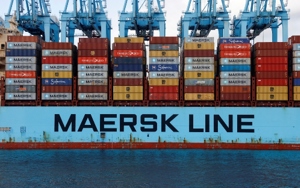Fashion industry driving demand for green shipping, Maersk says
(Reuters) - Fashion brands are a key driver of demand for green shipping fuels, according to shipping group Maersk, as the sector faces pressure from consumers and regulators to reduce their climate footprint.
Retailers ship huge volumes of clothes from production centers in countries such as China, Vietnam and Bangladesh to consumers around the world, causing carbon dioxide emissions.
Overall, the textile industry is estimated to be responsible for between 2% and 8% of global greenhouse gas emissions, according to a United Nations Environment Programme report published last month.
The shipping industry, which itself aims to achieve net-zero emissions by 2050, has begun offering low-emission fuels such as biofuels made from cooking oil and food waste or methanol produced from renewable energy as an alternative to fuel oil.
The fashion industry accounted for 26% of the more than 240,000 containers that Maersk shipped last year using biofuels under its ECO Delivery contracts, making it the biggest sector using the low-emission fuel service, the company said.
"Many of the fashion brands have actually been the ones going for this," Josue Alzamora, global head of lifestyle vertical at Maersk, told Reuters at this week's Global Fashion Summit in Copenhagen.
"Of course, fashion companies also feel the pressure from consumers," Alzamora said.
Nearly one out of 10 containers Maersk, the number two global ocean container shipping firm, handled for owners of fashion brands last year was shipped using biofuels, he said.
The ECO Delivery contracts are sold at a premium to regular shipping.
Methanol push
Many fashion brands and other retailers are looking at how they can respond to environmental issues raised by their often young and relatively affluent client bases, with companies pledging to cut emissions and reduce climate impact.
H&M, the world's second-biggest fashion retailer, said in 2022 that over the past two years it had purchased eco fuel for a "significant share" of its ocean transports. It has stated its ambition to become "climate positive" by 2040.
"H&M was one of the first companies to join the journey with us for biofuel," Alzamora said.
Retail giants including Amazon and IKEA have committed to switching fully to zero-carbon fuel shipping by 2040.
Biofuels can reduce emissions in container shipping by more than 80% compared to standard fuel oil. Still, vessels running on biofuels only accounted for around 2% of Maersk's total seaborne volumes last year.
Interest is also now also growing in methanol as an alternative fuel.
Maersk has ordered 25 such vessels with the first delivery in September.
In total, shipping companies have ordered more than 100 vessels that can operate on both fuel oil and methanol, according to Maersk. However, sourcing greener fuels such as methanol remains a challenge as the industry is still in its infancy.
"The fashion industry helps us to move the needle when it comes to getting more methanol produced," Alzamora said, pointing to the demand from the industry for alternatives given it is one of the biggest sectors for container shipping.







Comments